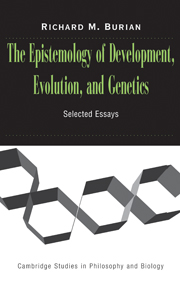Book contents
- Frontmatter
- Contents
- Preface
- 1 General Introduction
- PART I METHODOLOGICAL ISSUES
- PART II EVOLUTION
- 4 “Adaptation”
- 5 The Influence of the Evolutionary Paradigm
- 6 “Nothing in Biology Makes Sense Except in the Light of Evolution” (Theodosius Dobzhansky)
- PART III GENETICS AND MOLECULAR BIOLOGY
- PART IV DEVELOPMENT
- Index
- References
6 - “Nothing in Biology Makes Sense Except in the Light of Evolution” (Theodosius Dobzhansky)
Published online by Cambridge University Press: 05 June 2012
- Frontmatter
- Contents
- Preface
- 1 General Introduction
- PART I METHODOLOGICAL ISSUES
- PART II EVOLUTION
- 4 “Adaptation”
- 5 The Influence of the Evolutionary Paradigm
- 6 “Nothing in Biology Makes Sense Except in the Light of Evolution” (Theodosius Dobzhansky)
- PART III GENETICS AND MOLECULAR BIOLOGY
- PART IV DEVELOPMENT
- Index
- References
Summary
Theodosius Dobzhansky (1900–75) was one of the principal architects of the so-called synthetic theory of evolution. Born and initially trained in Russia, where he became an entomologist and zoologist with wide-ranging interests, he brought a rich background in systematics and study of natural populations with him when he came to the United States to learn genetics in the laboratory of T. H. Morgan in 1927 (Adams 1994). In the end, he remained in the United States, in part because of political developments in Russia, where he was ultimately declared a nonperson. Dobzhansky utilized his double background of work with natural populations and in Mendelian genetics in writing what came to be the singlemost influential book in the formative period of the synthetic theory of evolution (Dobzhansky 1937). Dobzhansky is a particularly interesting figure to study because of the cultural dualities (or, rather, multiplicities) that he embodies, because his work forcibly reconciled biological disciplines (i.e., systematics and natural history on the one hand, genetics on the other) that had not only drifted apart but had also built strong evidentiary bases for conflicting claims, and because – like many of the founders of the evolutionary synthesis – he sought to relate biological findings to issues in the wider culture.
This chapter takes its title from a talk that Dobzhansky delivered to the American Association of Biology Teachers (Dobzhansky 1973a).
- Type
- Chapter
- Information
- The Epistemology of Development, Evolution, and Genetics , pp. 103 - 120Publisher: Cambridge University PressPrint publication year: 2004
References
- 1
- Cited by

